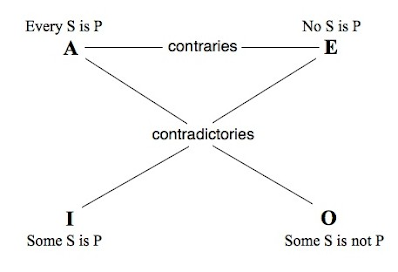Some thoughts on nature, logic, and same-sex attraction
One of the first objections that I think most left-leaners hear to the idea of same-sex attraction is that it is "unnatural." This is often met with scoff. "Are you saying that my gay relative/best friend is some kind of inhuman monster?" is one response. Another is "Clearly your view of nature is mistaken." Still another is "The idea of nature is bullocks. Things aren't naturally anything." Doubtless one could dispute the reason why so much scoff is thrown at the claim that same-sex attraction is unnatural; but after some reflection, something sticks out to me, and it has to do with the square of opposition.
Typically when someone says, "It is natural for this thing to be this way," many presume that he is saying, "This thing is always this way." For instance, were someone to say, "It is natural for dogs to have four legs," most, I think, would presume that he means "All dogs have four legs." On the square of opposition, this would be an "A" statement (found on the top-left in the picture above as "Every S is P"). Now, many beginners in logic first think that to refute "A" statements, one needs to prove the truth of the related "E" statement (found on the top-right in the picture above as "No S is P"). Thus, according to this reasoning, to disprove the claim that "All dogs have four legs," one would need to show that "No dogs have four legs." Of course, if one were to be able to prove this, it would in fact disprove the "A" statement. But it's not necessary. Rather, all one needs to do so is an "O" statement (found on the bottom-right as "Some S is not P"). That is, to disprove the claim that "All dogs have four legs," one need only show that some dogs do not have four legs. And in logic, "some" can mean "one". So if we found a dog (that is, a single dog) born with three legs, say, on account of some deficiency in the birthing process, logically, that would disprove the statement that "All dogs have four legs." Consequently, presuming that that statement is equivalent to "It is natural for dogs to have four legs," one would in principle have refuted that claim--one would in principle have shown that it is not natural for dogs to have four legs.
Similarly, when someone says, "It is natural for men to be attracted to women and women to men," the reason this is met with scoff is that the opponent can simply say, "Look, here is an example of a man attracted to another man or a woman to another woman. Clearly, then, your statement is false." However, this presumes that the statement "It is natural for men to be attracted to women and vice versa" is equivalent to "All men are attracted to women and all women are attracted to men," in which case it would be refuted by showing examples of men attracted to men and women attracted to women. But of course, this is not what we mean when we say that "It is natural for men to be attracted to women and women to men," just as when we say that it is natural for dogs to have four legs, we don't mean that every single dog in existence has four legs. If someone finds a dog with three legs, does that mean it is not natural for dogs to have four legs?
Aristotle said that nature is what happens always or for the most part. That last phrase is crucially important. That which happens naturally need not happen every single time. It need only happen most of the time. Nature is not refuted by counterexamples.



Comments
Post a Comment